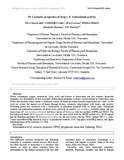Cosmetic properties of honey. 1. Antioxidant activity

View/
Date
2013-07-12Author
Palabras Clave
Antioxidant activity, Cosmetic properties, DPPH, Polyphenols, Humectant, Hydrating, TEACMetadata
Show full item recordAbstract
Honey components (sugars, aminoacids, lactic acid) may behave as humectants and also enhance humectant
properties in a formulation. Active principles of functional properties in honey vary according to visited flora, type
of bee and localities where honey is produced. Studies of honey in dermo-cosmetic applications are scarce. In this
work we review the topical use of honey through history, cutaneous interventions with honey, and toxicity.
Hydrating power was measured with a corneometer in emulsions prepared with six honey types. Polyphenol
contents and antioxidant properties of honey were measured to contrast Apis mellifera, imitation honey and pothoney
types of Tetragonula carbonaria and three species of Melipona, with two methods (DPPH and TEAC). The
Australian pot-honey of Tetragonula carbonaria was the most active with the DPPH method (IC50 83.33 mg/ml)
and the Brazilian pot-honey of Melipona fasciculata was the most active with the TEAC method (307.2 μ moles
Trolox equivalents/100g honey) as well as in polyphenol contents (718.7 mg gallic acid/100 g honey), and higher hydrating power of the emulsion (51.23%).
Información Adicional
| Correo Electrónico | maryisla@ula.ve lorediaz@ula.ve, loredive@yahoo.com elimariana@ula.ve, sheyla88@yahoo.com vitolivier@gmail.com |
| País | Venezuela |





